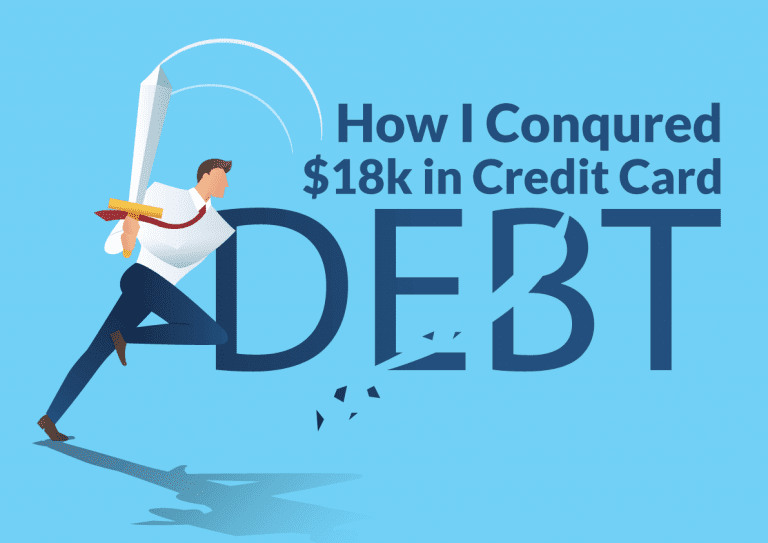How Mike Bell Paid Off $18,000 in Credit Card Debt
Mike Bell has been through some battles in his life – literally and figuratively –and he just won one that’s a story worth telling.
Bell paid off the last of a $18,000 credit card debt in the summer of 2019, but that was only half the fight he’s been waging.
Bell is a Navy veteran, who fought in Operation Desert Storm in Iraq in 1991. He came back to his home near Chicago with something called “Gulf War Syndrome,” which the VA describes as: “A cluster of medically unexplained chronic symptoms that can include fatigue, headaches, joint pain, indigestion, insomnia, dizziness, respiratory disorders and memory problems.”
Try fighting with credit card companies when you’re up against that mound of problems every day.
“I was about bankrupt in every way,” he said.
So much so that he concluded that – for his financial health at least – he might as well file for bankruptcy, ditch all his debt that way, and start all over again.
“I couldn’t see any other way out,” he said.
He told his boss, who quickly advised against it. It came up again in a conversation with his brother in law, who told him “don’t do it!” Another friend suggested he go online and find a nonprofit credit counseling agency to get help.
“That’s when I found InCharge Debt Solutions,” Bell said. “I called them and the first thing the counselor told me was ‘Don’t file for bankruptcy. We can help.’
“And they did. They saved my life debt wise.”
His road to credit card debt – and recovery from it – is not an unusual one.
He was accustomed to paying for things out of his checking account or with cash, but when the business his wife started had trouble getting off the ground, they turned to credit cards as a bailout.
Bell said his mailbox always was about half-filled with offers from card companies. He usually chucked them in the garbage, but the wording on some of the envelopes was too inviting.
“Just about every envelope said ‘Pre-Approved’ so I figured what the hell, fill ‘em out,” he said.
Approval was no problem and soon, Bell had a handful of credit cards. He’d never used one so he thought he’d ease himself into it. The initial plan was to only use them for “gas and emergencies.”
His wife saw other possibilities.
“I came home one weekend and she told me she bought $5,000 worth of appliances with my credit cards,” Bell said. “She was maxing out every card we had and they were all in my name.”
Bell’s response? He went to the mailbox, found another credit card offer, filled it out and started using that one. By the time he stopped receiving offers, he had 12 active credit cards.
“For a while, I just paid the minimum on all of them because I thought as long as you did that, you were OK,” Bell said. “But then I was getting so many bills every week that I couldn’t keep up with them and pretty soon I just ignored them or wadded them up and threw them away.”
The result was late payment penalties and interest added to his balance, making a bad situation worse. Then the phone started ringing. Collection agencies had taken over the accounts and wanted payments. At first, they would call every week. Then it became every day … and night.
“When I had the money, I’d send them a minimum payment just to get the bill collectors off my back,” Bell said. “But then they started threatening to sue me and take me court and making all kind of threats and I got scared.
“That’s when I started thinking bankruptcy was the only way out.”
The credit counselors at InCharge stopped that. The counselors worked with the card companies to reduce the interest he paid on the cards and arrive at a monthly payment he could afford.
It helped that his monthly check from the military service increased and he found a job as a chef so he paid off what usually is a five-year plan in just three and a half years.
A side benefit to the repayment plan was that his credit score did a back-flip.
“I was down in the 200s when I started the program with InCharge, but my credit score is up around 670 now,” Bell said. “That’s not great, but it’s a hell of a lot better that I was. At least now I have some credit where before I couldn’t get any.”
Bell said there was a couple of other benefits that he’s noticed now that he’s out of the debt management program.
“I’ve actually got money in a savings account,” he said, with both surprise and enthusiasm in his voice. “The counselors at InCharge did a great job of showing me how to budget so now I’m even starting a retirement account.
“I feel a thousand percent better about the future of my finances. I have no clouds over my head anymore. I can control my future. I even called my Mom and bragged to her that I’m completely out of debt. That felt really good.”

